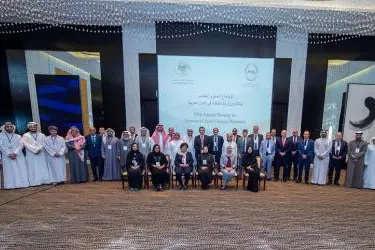PHOTO
Abu Dhabi: The United Arab Emirates held the fifth annual meeting of Arab Deputy Ministers. Organised by the Arab Monetary Fund (AMF), in cooperation with the UAE Ministry of Finance, the meetings took place over the course of two days at the Sofitel Hotel in Abu Dhabi. At the meeting white papers and other relevant topics were discussed along with preparations for the next Council of Arab Finance Ministers meeting set for April 2020. Also, tax legislation challenges and the role the markets play in financing development and infrastructure projects in Arab countries were discussed.
H.E. Younis Haji Al Khoori, Undersecretary of the Ministry of Finance, headed the UAE delegation at the meeting. Also present were Dr. Abdulrahman Bin Abdullah Al Hamidy, Director General and Chairman of the Board of Executive Directors of AMF, deputies of Arab finance ministries, experts and representatives from the International Monetary Fund (IMF), the World Bank Group (WBG), the Organisation for Economic Co-operation and Development (OECD) and several financial affairs specialists from Arab countries.
H.E. Younis Haji El Khoori highlighted the importance of the Arab Deputy Ministers meeting as an opportunity to share knowledge and learn about best practices for economic development in the Arab region in order to achieve sustainable growth.
H.E. said: “These meetings represent a vital platform to showcase the UAE model to the broader region, especially in terms of its experience in applying indirect tax reforms that have had a positive impact on development and competitiveness of the country. Furthermore, the model contributes towards building a sustainable knowledge economy for future generations.”
On the first day of the meeting a paper presented by the IMF on social spending for inclusive growth in arab countries, and a paper by the WBG on developing education systems to align with the needs of the labour market, as well as a study presented by AMF on the role of financial markets in financing development and infrastructure projects in the Arab countries and tax treatment of financial services and tools in Arab countries were deliberated.
The discussions and papers touched upon the policies and efforts of Arab countries that are aimed at enhancing the efficiency of social spending, especially in the education and health sectors. These will also bring benefits of efficient social spending systems, and setting priorities for investments to enhance skillsets among human capital to meet the requirements of the increasingly competitive labour market. The discussions also dealt with the role of financial institutions vis-à-vis the developments in the Arab region, as well as the economic and social impact of financing development and infrastructure projects. Furthermore, also discussed was the use of FinTech to enhance tax services and the opportunities digital financial services provide in administration and tax services.
The agenda for the second day included discussions on indirect tax reforms and public-private partnerships that were presented by Arab Deputy Ministers and Undersecretaries. Additionally, a presentation by the OECD on tax applications on FinTech and e-commerce services took place.
At the end of the meeting, the preparations for the Fifth Annual Arab Fiscal Forum and the next Council of Arab Finance Ministers meeting set to take place in November 2020, were discussed, followed by a concluding statement.
© Press Release 2020Disclaimer: The contents of this press release was provided from an external third party provider. This website is not responsible for, and does not control, such external content. This content is provided on an “as is” and “as available” basis and has not been edited in any way. Neither this website nor our affiliates guarantee the accuracy of or endorse the views or opinions expressed in this press release.
The press release is provided for informational purposes only. The content does not provide tax, legal or investment advice or opinion regarding the suitability, value or profitability of any particular security, portfolio or investment strategy. Neither this website nor our affiliates shall be liable for any errors or inaccuracies in the content, or for any actions taken by you in reliance thereon. You expressly agree that your use of the information within this article is at your sole risk.
To the fullest extent permitted by applicable law, this website, its parent company, its subsidiaries, its affiliates and the respective shareholders, directors, officers, employees, agents, advertisers, content providers and licensors will not be liable (jointly or severally) to you for any direct, indirect, consequential, special, incidental, punitive or exemplary damages, including without limitation, lost profits, lost savings and lost revenues, whether in negligence, tort, contract or any other theory of liability, even if the parties have been advised of the possibility or could have foreseen any such damages.




















